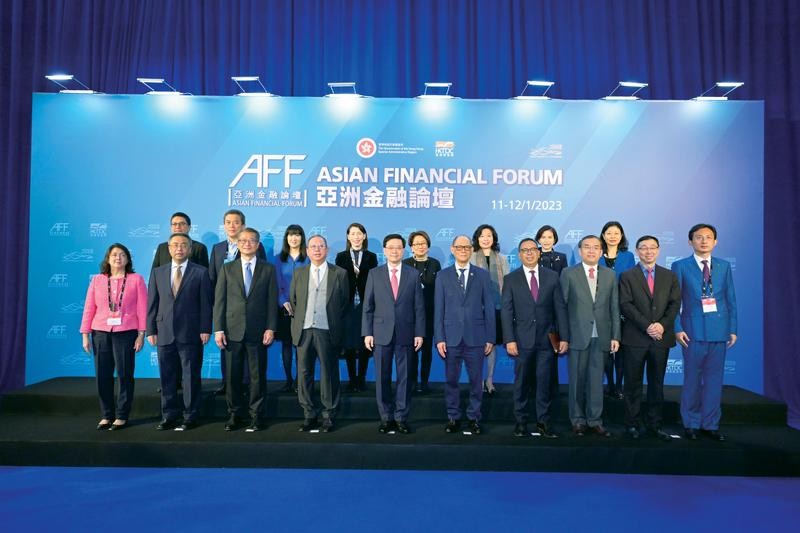2023-01-13
Oswald Chan in Hong Kong

Hong Kong is ramping up financial technology innovations and green and sustainable finance initiatives to ensure the city can contribute to the building of a global inclusive, innovative and sustainable economy. Political heavyweights and policymakers made the remarks at the two-day 2023 Asian Financial Forum on Wednesday and Thursday, organized by the Hong Kong Special Administrative Region government and the Hong Kong Trade Development Council, with participants from more than 70 countries and regions. This year’s forum invited more than 100 participants to share their insights on international finance and economy, trade, sustainability and other issues. There were more than 2,000 live participants, with 3,000 others attending the event online. Chief Executive John Lee Ka-chiu said the HKSAR administration has launched two rounds of the Fintech Proof-of-Concept Subsidy Scheme in the past two years to encourage fintech players to test innovative concepts that can boost operational efficiency and expand customer services. “The scheme approved more than 90 projects in 2021, covering key financial service areas such as wealth management, regulatory compliance, insurance and payment. It also funded the trial of robo-advisors and the digitization of anti-money laundering, risk monitoring, client authentication, insurance claims and ESG (environmental, social and governance) technology assessment,” the chief executive said. The funding plan’s second round is still open and more than 120 applications have been received to date, Lee added. With the administration’s efforts to promote fintech, Hong Kong now boasts more than 800 fintech companies, up from about 180 five years ago, providing services from virtual banking, asset management and insurance technology, to robo-advisory, blockchain, digital trading, payments and cybersecurity, he said. “We are working closely with our financial regulators and public agencies to enhance Hong Kong’s fintech infrastructure, provide an enabling regulatory framework, encourage financial innovation and nurture talent,” Lee noted. The Faster Payment System, launched in 2019, is another fintech innovation that helps in promoting financial inclusion in Hong Kong. FPS registrations reached some 11 million in 2022 with more than 80 percent of government departments providing the service as a payment option. The Commercial Data Interchange, launched in October last year, allows enterprises to share their data with banks through a central platform, enabling more convenient financial services. Besides fintech innovation, Hong Kong is eyeing a green and sustainable financing hub status to make a contribution to building a global sustainable economy. Last week, Hong Kong SAR issued $5.75 billion worth of ESG bonds denominated in US dollars, euros and offshore renminbi, the world’s largest ESG bond issuance in Asia to date, and the first issuance of green bonds by an Asian government in a triple-currency offering. Secretary for Financial Services and the Treasury Christopher Hui Ching-yu said, “The financial industry is an important part of Hong Kong’s economy, and the industry should not only serve its own interests but can also use capital to benefit society.” The financial services chief added that the recently launched carbon credit trading platform can help Hong Kong to become a hub for green and sustainable finance. Asian Infrastructure Investment Bank President and Chair Jin Liqun concurred, saying “Hong Kong is well placed to become a regional carbon credit trading hotbed matching the financing needs of greenhouse gas reduction projects in the Chinese mainland with global investors and emitters, and the city definitively can play an outsized role in mobilizing financial resources towards Asia’s net-zero transition.” Hong Kong possesses immense potential to emerge as Asia’s green finance hub, Jin argued, with the city’s 67 initial public offerings launched in 2022 whereas 72 percent of the $87.8 billion in capital raised on the Hong Kong Stock Exchange was directed toward new economy ventures. Green and sustainable financing is particularly important for Asia as “the region’s development has been carbon intensive, and the region is also likely to suffer disproportionately from climate change”, argued Theresa Kho, director general of the East Asia Department at the Asian Development Bank. “From 2019 to 2022, the ADB has invested the equivalent of $20.4 billion in climate change projects,” Kho said, adding that the ADB in the future will scale up innovative financing solutions, and set up a community resilience financing partnership facility, to catalyze climate finance. The forum saw the attendance of Ban Ki-moon, the eighth secretary-general of the United Nations; Helen Clark, the former prime minister of New Zealand; and Christiana Figueres, the former executive secretary of the United Nations Framework Convention on Climate Change. Finance chiefs from Luxembourg, Thailand and the Philippines also joined the forum.